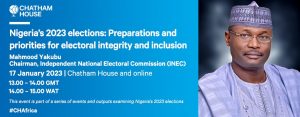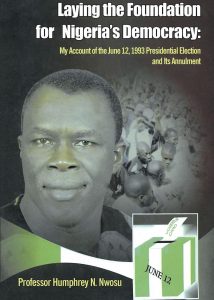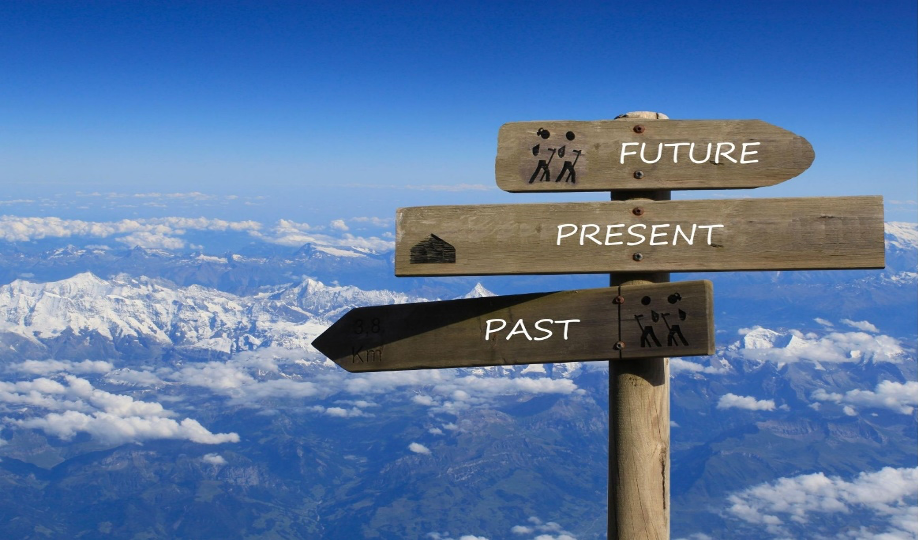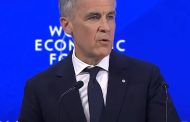By Adagbo Onoja
Has February 25, 2023 got much to do with June 12, 1993 in Nigerian politics? This is the same as asking if History repeats itself or if the social world is a matter of the past, present and future in that sequence? However framed, it is a question many, millions in fact, would answer yes without thinking twice. But would such an answer have anticipated its own weaknesses?
The Similarities
 Surely, June 12 in Nigerian politics shares certain features with February 25, 2023 in spite of a gap of 30 years. First, all two are electoral stalemates. Second, they took place under a Nigerian leader whose overarching orientation is military. It would be difficult to know who, between IBB and President Buhari, is more military, IBB being the only militariat that Dr Stanley Macebuh certified to have most comprehensively civilianised. That claim contrasts with Punch’s interrogation of Buhari’s progression in civilianising. Third, the highpoint in both June 12 and 2023 is the point of announcement. That of June 12 was stopped while that of 2023 just didn’t come, contrary to the live transmission voters had been told would be the case. Fourth, the conflict became ethnicised even as the issues involved are beyond the ethnic categories. In June 12, the Yoruba elite fingered their Hausa/Fulani counterpart. 2023 has assumed a largely Yoruba/Igbo dimension. Fifth, the election management body or the head in each case – Prof Humphrey Nwosu in 1993 and Prof Mahmood Yakubu in 2023 – became objects of ridicule. Nwosu found his voice by writing a book account of what happened. Yakubu is perhaps too disorganised to find his voice yet.
Surely, June 12 in Nigerian politics shares certain features with February 25, 2023 in spite of a gap of 30 years. First, all two are electoral stalemates. Second, they took place under a Nigerian leader whose overarching orientation is military. It would be difficult to know who, between IBB and President Buhari, is more military, IBB being the only militariat that Dr Stanley Macebuh certified to have most comprehensively civilianised. That claim contrasts with Punch’s interrogation of Buhari’s progression in civilianising. Third, the highpoint in both June 12 and 2023 is the point of announcement. That of June 12 was stopped while that of 2023 just didn’t come, contrary to the live transmission voters had been told would be the case. Fourth, the conflict became ethnicised even as the issues involved are beyond the ethnic categories. In June 12, the Yoruba elite fingered their Hausa/Fulani counterpart. 2023 has assumed a largely Yoruba/Igbo dimension. Fifth, the election management body or the head in each case – Prof Humphrey Nwosu in 1993 and Prof Mahmood Yakubu in 2023 – became objects of ridicule. Nwosu found his voice by writing a book account of what happened. Yakubu is perhaps too disorganised to find his voice yet.
A sixth common feature of both is forewarning. Undoing what the popular press in Nigeria has tagged the Hausa/Fulani oligarchy was the definitive agenda of the 1993 election for a section of the country. Tell, the Lagos based weekly, ran a cover story titled “Strategies for a Southern president” much earlier. Much, much earlier too, someone had asked if the establishment would yield to a defeat. It was Prof Jerry Gana in one of the radical sessions at the Government House in Kano under Muhammadu Abubakar Rimi in the Second Republic. Gana said, inter alia: The critical question that arises, especially within the context of the Nigerian State is whether capitalist democracy would respect its own legal order in case of an electoral triumph for socialism. In other words, if the progressives in Nigeria were to win a decisive victory at the polls against the reactionary forces, would such forces not revert to illegal and unconstitutional means to defend their interests?” Until recently when the Bola Tinubu calculus diluted and nationalised the Nigerian establishment, it is arguably safe to read the ‘Strategies for a Southern president’ and the Gana poser as one and the same thing. Forewarning is also a major feature of 2023. Chief Bode George’s threat to go on exile if Asiwaju Tinubu won the election is still fresh in the minds. So also Chief Ayo Adebanjo’s threat that it will be trouble if Peter Obi of the Labour Party did not win the election. Asiwaju Tinubu left no one in doubt that it is his turn. From the hindsight, it seems Prof Jerry Gana made a far more substantial point almost 40 years ago. Unfortunately, the threshold has gone too low the crisis in Nigeria is not being framed that way. And people are just speaking in reductionist tongues about rigging without situating the rigging in the condition within which it could ever have been possible. Yet, they expect everyone to go along with such technicism. There is no doubt about it that Peter Obi was successfully communicated as the signifier of progress – such a theoretical and organisational embarrassment for the Nigerian Left although the Left is not unified on Obi- but did that also mean that the broad camp of progressives did the amount of work that could have guaranteed and sustained his electoral victory? It is not surprising that Jerry Gana’s poser at a Government House, Kano radical session is not part of the repertoire of contemporary progressives’ politics.
 The seventh feature common to all is collateral damage that some individuals became in both cases. A leading traditional ruler in the Southwest and a serving Colonel at the time exemplifies that of June 12. There have no doubt been casualties already in the case of 2023 even as a good enough list is still in the making. In the meantime, it is in the nature of things that it is otherwise a jolly good fellow who got the unforgettable reminder about contesting deputy-governorship of Ogun State with someone with worse implications in drug business than Asiwaju Tinubu’s case. It is never possible to remember everything. Dr. Reuben Abati, Arise TV’s anchorman, forgot to duck.
The seventh feature common to all is collateral damage that some individuals became in both cases. A leading traditional ruler in the Southwest and a serving Colonel at the time exemplifies that of June 12. There have no doubt been casualties already in the case of 2023 even as a good enough list is still in the making. In the meantime, it is in the nature of things that it is otherwise a jolly good fellow who got the unforgettable reminder about contesting deputy-governorship of Ogun State with someone with worse implications in drug business than Asiwaju Tinubu’s case. It is never possible to remember everything. Dr. Reuben Abati, Arise TV’s anchorman, forgot to duck.
The Differences
There the similarities seem to end and give way to the differences except if newer ones can be found. The first major difference is that while the outcome of June 12 was never formally announced, that of February 25, 2023 was formally declared. That June 12 was never announced left June 12 advocates with the innovation of qualifying the winner with ‘presumed’, which comes with implied boundaries. The second major difference is the atmosphere that preceded each. In the case of June 12, there was no enthusiasm for the election. The media, the intelligentsia and the activists were certainly not in the mood because people had grown weary of what later came to be conceptualised as IBB’s endless transition. The opposite is the case regarding 2023. The youths who had found their strength in the social media took positions just as religious groups did, either in opposition to or support for the Muslim – Muslim ticket of the All Progressives Congress (APC).
The third key difference must be that June 12 was not characterised by violence before and on that day. It became violent after, lasting for a long time. 2023 witnessed violence ahead and on the day of the election, especially the last phase. Fourth, the scarcity of a conditioning voice. In the case of June 12, the late Mallam Adamu Ciroma provided that by declaring that Chief Abiola won fair and square. That statement was a watershed because Ciroma was someone who was beyond rebuke both within the establishment, the popular press and in politics. The junta must have been distressed when he made the statement. In the case of 2023, only Chief Obasanjo sent signals that Peter Obi won the election but Obasanjo probably forgot that he had written a well-publicised letter endorsing Peter Obi previously. What that meant is that the Obasanjo voice on February 25 was not a neutral voice like Adamu Ciroma who went quiet after he was summarily disqualified along with the late General Shehu Yar’Adua. The puzzle is why the generation after Ciroma appear to lack people with such mystique. Was it because Ciroma went to UI, was a super editor, was beyond corruption or what?
Of course, Alhaji Tanko Yakassai is one individual with credibility to replicate Mallam Adamu Ciroma. He has the pedigree but he had stated his support for Asiwaju Tinubu, including the reasons for that and must have realised, unlike Obasanjo, that saying that Obi or Asiwaju won the election would not be a statesman talking anymore. Hajia Najatu Mohammed would equally have been a powerful voice on who won or did not win if she had not taken the position that Asiwaju is too sick to be given the presidency. Neither Tanko Yakassai nor Hajia Najatu made a mistake in taking a position but that they would have been the Adamu Ciroma of this era if they hadn’t. IBB must have realised that whatever he said would be used against him and has, wisely, refrained from saying anything. He is not as careless as his oga, Chief Obasanjo. It would be difficult to know what would happen today if Gen Abdulsalami Abubakar were to say that Peter Obi/Asiwaju won or did not win the February 25, 2023 election. If the late Bala Usman were here, he would say it, it would go a long way and nothing would happen to him. Wole Soyinka has not said Peter Obi or Asiwaju won the election but Facebook level reaction to Soyinka has read him off in terms of ‘meaning is what is unsaid’. Soyinka is not vulnerable but his attackers certainly subtract something from his stature by reading him off that way.

Prof Adele Jinadu
As things are now, it is only the intellectuals experimenting with innovations in enhancing electoral democracy in Nigeria who are talking. But even then, it is still a ‘read our lips’ approach to talking. That is perhaps because what would have been their moment as intellectuals of electoral statecraft has magically evaporated into thin air, leaving them vulnerable to the charge by some of their former students and the generation below them that they might be on a journey to nowhere. Prof Adele Jinadu, the leader of this crop is basically coming to terms with the charge by saying repeatedly that the politicians are impossible. But there is a quality of newness in what they are trying to do when we consider recent developments in social theory (standpoint political theory, political discourse analysis, quantum social theory) and the unfortunate but constantly dwindling fortune of radical politics in Nigeria. It is probably proper for all who can contribute to that effort in whatever ways possible to do so. Elements in the intellectual camp in question are not saying this or that candidate won the election but if we take readership of Intervention as a measure of the acceptability of what they say, it is clear people listen to them or take what they say seriously and this is notwithstanding that Intervention’s coverage of the fora they appear has been understandably inconsistent.
The fifth difference between 1993 and 2023 is how distinctly fierce 2023 has become compared to 1993. Since the campaigns to this moment, the social media has become a battlespace. The capacity of Nigerians to dig clips, newspaper advertorials, old interviews and different other textualities is perhaps unmatched anywhere in the world. It seems that people believe that once a stuff goes viral, it necessarily makes the point irrespective of the re-inscription that follows. Only a populace stuck in that radius of media literacy must have the kind of infatuation with (social) media stuff the way Nigerians do. But they can produce very entertaining mediation of politics. There is nothing inherently bad with that except that it can mislead people to think that because they spread so, so message to so, so WhatsApp platforms, they have done their job. No. messages do not have any meaning in themselves if not further politicised. If only for the battlespace that the (social) media became, Nigeria should probably be holding election every other year. In 1993, the battlespace was not the social but traditional media – newspapers, weekly magazines, TV and radio. It wasn’t yet the era of 24-hour broadcasting in 1993, CNNisation itself being a 1991 affair.
The result is that discursive power will be decisive in the politics ahead. As everyone knows, discursive power is the ultimate form of power. How might such a claim be exemplified? There might be no better illustration than Obierika and Okonkwo in Achebe’s Things Fall Apart. In the novel, Okonkwo was the complete man of power. Achebe said he walked as if tip toing and was going to pounce on someone and often did pounce. Action, not reflection, was his mode of self-enactment. He was a ranked member of the community – wives, barns and a guaranteed front rank reckoning.
But it is difficult to recollect anytime he ever defeated Obierika, his friend and the philosopher in the novel. For instance, when Okonkwo exhibited in the one-dimensional reasoning that he was right to participate in the decapitation of Ikemefuna because it was the directive of the gods, Obierika punctured that by arguing that the gods never named Okonkwo specifically for the task. Okonkwo’s power was coercive/structural power while Obierika’s was discursive power or the power that emanates from re-inscription of cultural resources to create a hegemonic regime of truth. Incapable of re-inscribing what the gods said or what the culture insisted upon or what was relayed to him, Okonkwo would go on from one blunder to another, making him so vulnerable as to rely on Obierika’s hegemonic instructorship. It was not because Obierika was wise.
Fifth difference is heroes and antiheroes in each case. Aside from Dangiwa Umar who, though a privileged military officer, took the position that Abiola should exercise power, a position for which he was punished, there were few genuine heroes in June 12. There were too many people saying things in public and doing different things in private. Of course, many commoners paid the supreme sacrifice but their heroism remains buried in figures without their names and other details. February 25 is completely different. Peter Obi remains unbowed in spite of the tremendous pressure and attrition. He has stretched the political construction of truth to its limit, making irrelevant the fact of his profile as a banker/businessman who was a member of an establishment party as the PDP up to just yesterday; who invaded a Left party even though he himself has no pretensions to Left orientation. He has been successfully represented as the symbol of the change so desperately needed in the society. In Peter Obi, discourse theory finds one of its most successful demonstration. It is most exciting that the site of the demonstration is Nigeria where discourse theory is nearly absent in much of university curricular except in Literature, English, French and perhaps Mass Communications. His second in command, Datti Ahmed is equally extending the radius of their space in the polity, ignoring contending interpretation of what he says.
And from the Asiwaju Tinubu camp, we also see incredible capacity to hold the fire and remain faithful to camp politics as exemplified by Dele Alake and Bayo Onanuga. Their tendency to clinic finish is not a matter that can be understood as loyalty but a matter of rolling up the sleeves for what they have been a part and parcel of. Didn’t Bayo Onanuga say he introduced Prof Yemi Osinbajo to Asiwaju Tinubu? The Tinubu imaginnaire is now beyond Bola Tinubu. It has its theorists, strategists, tacticians in different dimensions, especially its publicists which the twosome are the face of. It is not something from which any of these categories of operatives should suffer a Pauline conversion at this point by pleading moral categories. That would not even be betrayal but crisis of subjectivity. Those applying moral categories to rate them completely miss the point. The point is they and their likes in Nigeria are proficient in the discursive constitution of reality. Many Nigerians take concepts on their face value and start using moral categories to assess things, missing the significance completely.
Given the entanglement between June 12, 1993 and February 25, 2023, why would it not be correct to say that history repeats itself or that the social world is a flow of the past, present and future? The argument for that will form part two of this piece!




























